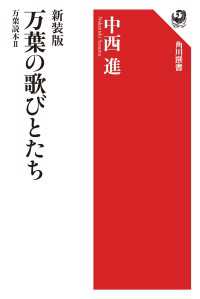- ホーム
- > 洋書
- > ドイツ書
- > Humanities, Arts & Music
- > Linguistics
- > general surveys & lexicons
基本説明
This co-edited collection of independent studies written by scholars from many different countries addresses the thorny issue of criticism in science through discourse analysis of written scientific texts.
Full Description
In order for science to advance, previous research findings must be reviewed and criticized. However, conveying criticism is particularly difficult for scientists who must, at the same time, try to maintain an impersonal stance. This co-edited collection of independent studies written by scholars from many different countries addresses the thorny issue of criticism in science through discourse analysis of written scientific texts.
The research reported in this volume deals with questions such as: 1) how criticism is conveyed by various linguistic communities, such as Serbian, French, Spanish, German and English; 2) how criticism is handled in various genres, with examples drawn from book reviews, referees' reports, research articles, editorials, and review/meta-analysis papers; 3) the extent to which criticism is influenced by academic discipline, with findings from linguistics, economics, biology, business, musicology, chemistry, literary research, medicine, and physics, and 4) the impact interpersonal considerations have on the linguistic realization of criticism.
The conclusions reached by these contributions have implications for both the academic world and society at large in the sense that a fuller understanding of how criticism is expressed will help in the education of future scholars and in the understanding of the social construction of knowledge.
Contents
Contents: Françoise Salager-Meyer/Beverly A. Lewin: Introduction - Federico Navarro: The Critical Act as a Pragmatic Unit for Studying Academic Conflict: A Methodological Framework - Esmat Babaii: Hard Science, Hard Talk? The Study of Negative Comments in Physics Book Reviews - Davide Simone Giannoni: 'Don't be stupid about intelligent design': Confrontational Impoliteness in Medical Journal Editorials - Dimitra Koutsantoni: 'I felt that the proposal had some promise, but was hampered by lack of specificity [...]': Personal Attribution and Mitigation in Grant Proposals Peer review Reports - Beverly A. Lewin/Hadara Perpignan: Mind the Gap: Criticism in Literary Criticism - Seyyed-Abdolhamid Mirhosseini: Who Accepts? Who Rejects? The Case of a Rejected Paper in Applied Linguistics - Françoise Salager-Meyer/María Ángeles Alcaraz Ariza: Expert Knowledge-Holders, Knowledge-Builders and Factual Reporters: Critical Voices in Medical Genres - Zofia Golebiowski: Scholarly Criticism Across Discourse Communities - Ana I. Moreno Fernández/Lorena Suárez: Academic Book Reviews of Literature in English and Spanish: Writers' Visibility and Invisibility Strategies for Expressing Critical Comments - Trine Dahl/Kjersti Fløttum: Wrong or Just Different? How Existing Knowledge is Staged to Promote New Claims in English Economics and Linguistics Articles - Phuong Dzung Pho/Simon Musgrave/Julie Bradshaw: Establishing a Niche in Applied Linguistics and Educational Technology Research Articles - Bojana Petrić: Scholarly Criticism in a Small Academic Community: A Diachronic Study of Book Reviews in the Oldest Serbian Scholarly Journal - Olivia Fong-wa HA: A Diachronic Study of Music Criticism: The Case of Record Reviews.
-

- 電子書籍
- 鎌田式 おきらくハッピーエンディングノ…
-

- 電子書籍
- 世界を救った英雄を育てた最強預言者は、…
-

- 電子書籍
- 【フルカラー】柳原くんはセックス依存症…
-

- 電子書籍
- 新装版 万葉の歌びとたち 万葉読本II…




